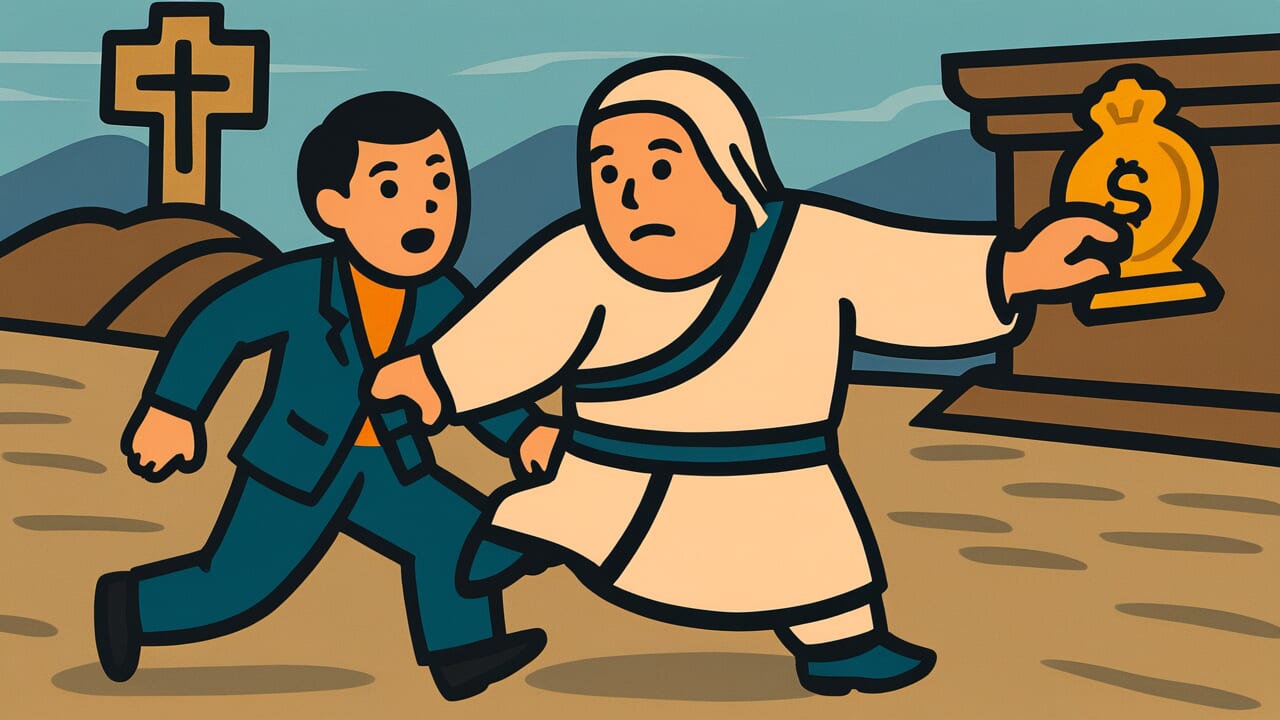How to Read “Outrunning the god of poverty by earning”
かせぐにおいぬくびんぼうがみ
Meaning of “Outrunning the god of poverty by earning”
This proverb means that no matter how hard you work and earn money, you still can’t escape poverty. It’s as if the god of poverty keeps overtaking you.
The saying describes situations where your efforts don’t pay off due to bad luck. You work seriously but remain stuck in financial hardship.
People use this expression when misfortunes keep piling up despite honest work. Illness, accidents, or unexpected expenses beyond your control keep coming one after another.
This phrase works better than simply saying “bad luck” because it emphasizes the contrast between effort and misfortune.
By placing “earning” (an active effort) next to “outrunning” (an impossible reality), the expression captures a deep sense of frustration.
Even today, people understand the painful truth behind these words. They describe situations where working hard doesn’t make life easier—in fact, difficulties seem to multiply instead.
Origin and Etymology
The exact literary origin of this proverb remains unclear. However, it clearly comes from deep roots in Japanese folk beliefs.
The god of poverty has appeared in Japanese folktales and legends since ancient times. People believed this deity would possess households and drive away wealth.
The structure of this phrase is quite interesting. Instead of saying “catching up,” it uses “outrunning.”
This word choice shows something important. No matter how desperately you work and earn, the god of poverty always stays ahead of you. You can never catch up—a truly hopeless situation.
Life for common people during the Edo period was harsh. Many couldn’t escape poverty no matter how hard they worked.
Bad weather ruined crops. Fires destroyed homes. Illness struck without warning. One misfortune after another attacked people’s lives.
Through these experiences, people felt the power of fate—something beyond their own efforts. This proverb likely emerged from such harsh realities.
By attributing misfortune to a supernatural being, our ancestors tried to explain bad luck beyond human control. Their worldview lives on in these words.
Usage Examples
- 彼は真面目に働いているのに、病気や事故が続いて稼ぐに追い抜く貧乏神だね
- 副業まで始めたのに出費ばかり増えて、まさに稼ぐに追い抜く貧乏神の状態だ
Universal Wisdom
This proverb has survived through generations because it touches on a fundamental question everyone faces. It’s about the relationship between human effort and fate.
We want to believe that “hard work pays off.” But reality sometimes proves different. No matter how seriously you work, unexpected misfortunes can strike one after another.
This saying offers deep insight into life’s unfairness. It doesn’t deny the value of effort at all.
Instead, it gives words to the pain that hardworking people feel when their efforts go unrewarded. The contrast between “earning” (an active deed) and “outrunning” (a passive defeat) vividly captures human helplessness.
Our ancestors personified this unfairness as the god of poverty. This wasn’t just superstition. It was wisdom that acknowledged the power of fate beyond our control.
Rather than taking all responsibility on yourself, sometimes you need to admit bad luck. This can lighten the burden on your heart.
The proverb contains this kind of human kindness. The image of humans swaying between effort and fate represents a universal truth that never changes with time.
When AI Hears This
Just as a cleaned room inevitably gets messy again, the universe follows an iron rule. Order naturally falls into disorder. This is the second law of thermodynamics.
The phenomenon of earning money but not escaping poverty can actually be explained by this physical law.
Earning money is an act of creating order from chaos. For example, earning 200,000 yen per month means concentrating your time and energy to gather value in one place—your bank account.
But just maintaining life causes money to scatter naturally in all directions. Rent, food, utilities, communication fees—money disperses without any effort. This is entropy increase in action.
The real problem is when the rate of dispersion exceeds the rate of earning. If you earn 200,000 yen monthly but 180,000 yen automatically disperses for living expenses, plus 30,000 yen disappears in unexpected costs, you can’t maintain order in your bank account system no matter how hard you try.
Just as a refrigerator can’t stay cold without continuous external power supply, escaping poverty requires energy input that far exceeds the dispersion rate.
In other words, being overtaken by the god of poverty isn’t about laziness. It’s a physical state where input energy loses to dispersion speed.
Lessons for Today
This proverb teaches modern people the courage to accept reality. Effort alone cannot control everything in life. This isn’t about giving up—it’s wisdom for protecting your mental health.
Modern society overemphasizes “personal responsibility.” If you keep blaming yourself for not trying hard enough when things go wrong, your heart becomes exhausted.
This proverb teaches the importance of sometimes acknowledging bad luck. Maybe your efforts aren’t insufficient—maybe you just happened to face a string of misfortunes.
At the same time, this saying teaches kindness toward others. When you see someone struggling financially, don’t immediately judge them as “not trying hard enough.”
Imagine they might be fighting invisible misfortunes. That imagination is the first step toward compassion.
What matters is acknowledging bad luck while continuing to move forward within your capacity. Even if the god of poverty overtakes you, if you don’t stop walking, the wind might change direction someday.



Comments